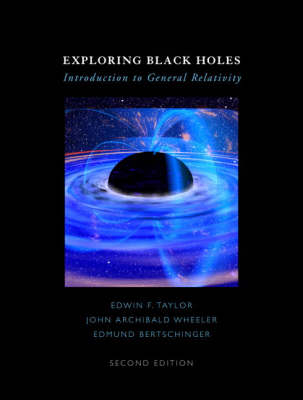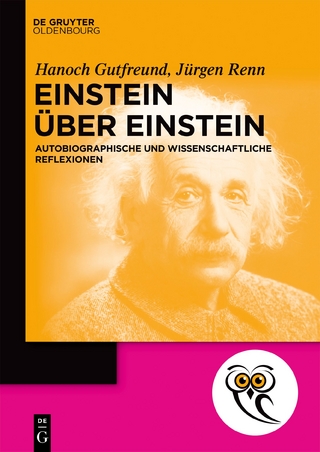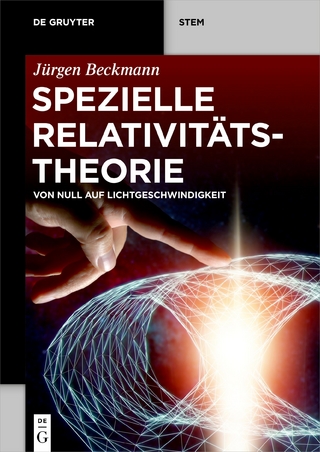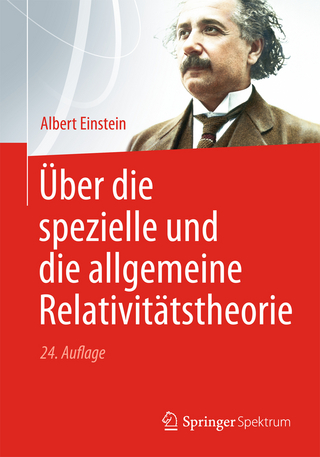
Exploring Black Holes
Pearson (Verlag)
978-0-321-51286-4 (ISBN)
- Titel ist leider vergriffen;
keine Neuauflage - Artikel merken
Edwin F. Taylor is a Senior Research Scientist Emeritus in the Department of Physics at the Massachusetts Institute of Technology. He graduated from Oberlin College and earned a PhD from Harvard University. He has received the Oersted Medal, the highest award of the American Association of Physics Teachers "for notable contributions to the teaching of physics," and was an editor of the American Journal of Physics for six years. Dr. Taylor has written interactive software for physics education, as well as numerous articles, reports, and reviews for both technical and trade publications. His book-authoring career began with Introductory Mechanics (Wiley, 1963); since then, he has written An Introduction to Quantum Physics with A. P. French (Norton, 1978), Spacetime Physics (Freeman, 1992) with John Archibald Wheeler, and the first edition of Exploring Black Holes (Addison-Wesley, 2000), also with Wheeler. John Archibald Wheeler (born July 9, 1911) is an eminent American theoretical physicist. He received his doctorate from Johns Hopkins University in 1933, and went on to become a professor of physics at Princeton University from 1938-1976, then a professor of physics at the University of Texas at Austin. During his teaching career, he placed a high priority on education and student motivation. Wheeler made important contributions to theoretical physics. In 1937 he introduced the S-matrix, which became an indispensable tool in particle physics. He was a pioneer in the theory of nuclear fission, along with Niels Bohr and Enrico Fermi. In 1939, he collaborated with Bohr on the liquid drop model of nuclear fission. During World War II, Wheeler interrupted his academic career to participate in the development of the U.S. nuclear bomb under the Manhattan Project at Hanford, WA, where reactors were constructed to produce plutonium for the bomb which was to be dropped on the Japanese city of Nagasaki. He went on to work on the development of the American hydrogen bomb under Project Matterhorn B. After concluding his Project Matterhorn work, Wheeler returned to Princeton to resume his academic career, and subsequently worked on extensions to general relativity, geometrodynamics, the theory of gravitational collapse, quantum gravity, and more. Wheeler was awarded the Wolf Prize in Physics in 1997. He maintained an office in Jadwin Hall at Princeton up until 2006. Edmund Bertschinger is a Professor of Physics and Division Head of Astrophysics at MIT. He is a theoretical astrophysicist whose research interests focus in cosmology and relativistic astrophysics. A native of California, he received his B.S. in physics from Caltech in 1979 and his PhD in Astrophysical Sciences from Princeton University in 1984. Following postdoctoral positions at the University of Virginia and at UC Berkeley, he joined the MIT faculty in 1986, where he rose through the ranks reaching his present position as full professor in 1996. Professor Bertschinger is passionate about education. He enjoys teaching classical mechanics, electromagnetism, quantum mechanics, relativity, and cosmology. In collaboration with Dr. Edwin Taylor, he introduced an undergraduate class on black holes and astrophysics that is taken by MIT alumni as well as by undergraduates. In 2002 he received the Physics Department's Buechner Teaching Prize for his undergraduate and graduate classes in relativity. Professor Bertschinger also loves working with students on research in astrophysics, cosmology, and general relativity. His research students at the high school and undergraduate level have won national prizes for their work, including First Prize in the Intel Science Talent Search. His former PhD students now hold faculty positions at Harvard, UC Berkeley, and other fine universities. As a member of the MIT Kavli Institute for Astrophysics and Space Research, Professor Bertschinger leads a research program studying the mysteries of dark energy and dark matter. He and his research students investigate the formation of cosmic structure after the big bang, the physics of dark matter both in the early universe and in forming galaxies, and the physical processes governing matter and radiation close to black holes. As a member of the MIT Kavli Institute for Astrophysics and Space Research, Professor Bertschinger leads a research program studying the mysteries of dark energy and dark matter. He and his research students investigate the formation of cosmic structure after the big bang, the physics of dark matter both in the early universe and in forming galaxies, and the physical processes governing matter and radiation close to black holes.
1. Speeding (Review of Special Relativity)
2. Curving (Spacetime Near a Non-Rotating Black Hole)
Project A: The Global Positioning System
3. Plunging (Diving Toward a Black Hole)
Project B: Inside The Black Hole
4. Orbiting (Zooming Around a Black Hole)
Project C: Advance of Mercury's Perihelion
5. Seeing (Bending and Orbiting Light)
Project D: Einstein Rings
Project E: Light Slowed Near Sun
Project F: The Spinning Black Hole
Project G: The Friedmann Universe
Appendix A: Readings in General Relativity
Appendix B: Glossaries of Symbols and Terms
Appendix C: Selected Formulas
Appendix D: Selected Physical Constants
| Sprache | englisch |
|---|---|
| Maße | 216 x 254 mm |
| Gewicht | 1000 g |
| Themenwelt | Naturwissenschaften ► Physik / Astronomie ► Relativitätstheorie |
| ISBN-10 | 0-321-51286-3 / 0321512863 |
| ISBN-13 | 978-0-321-51286-4 / 9780321512864 |
| Zustand | Neuware |
| Haben Sie eine Frage zum Produkt? |
aus dem Bereich


